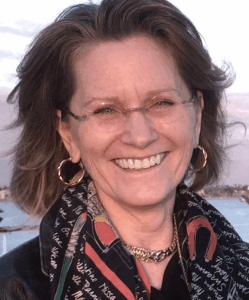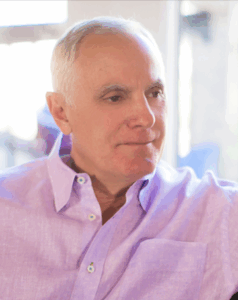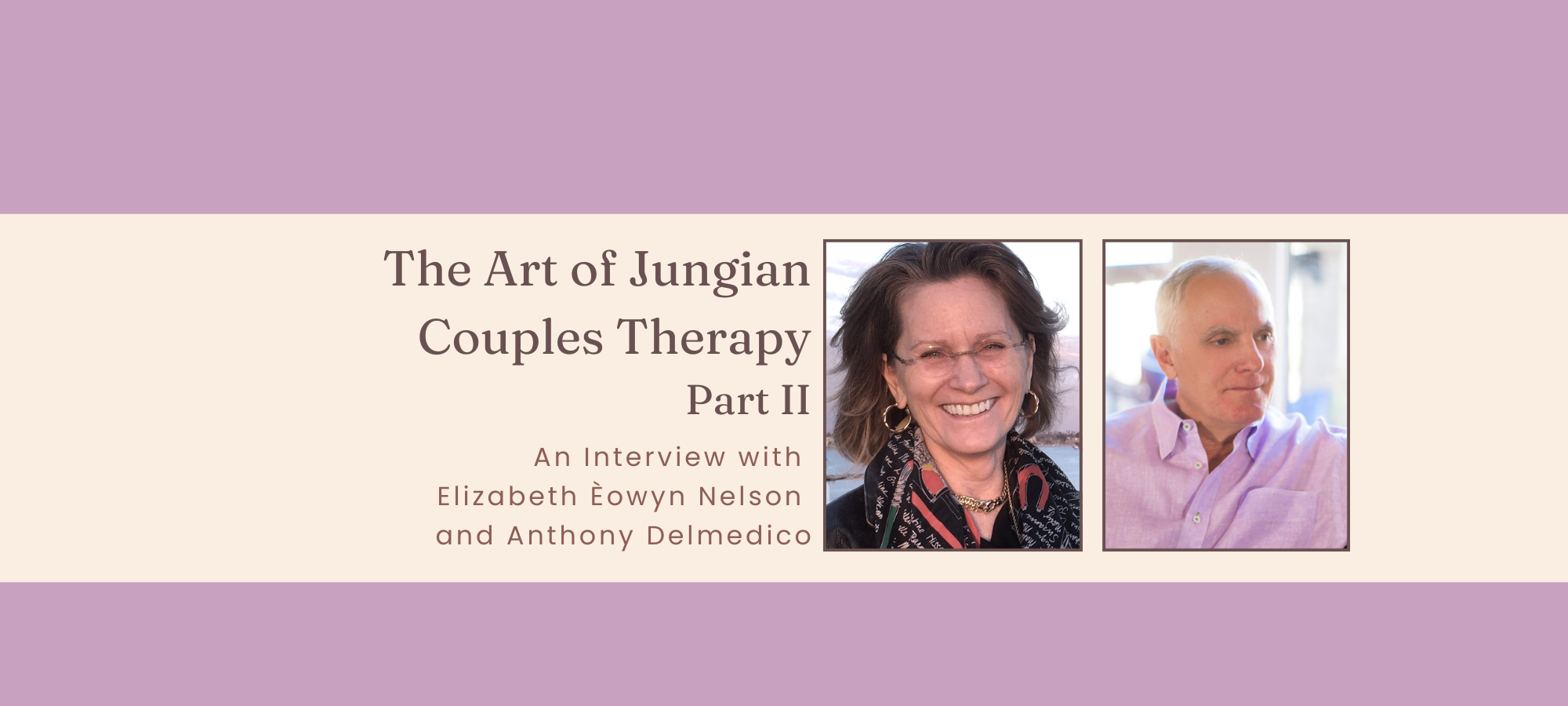Anthony A. Delmedico, PhD, LMFT, is an alumni of Pacifica’s Ph.D. Depth Psychology with an Emphasis in Psychotherapy program. Elizabeth Èowyn Nelson, PhD, is a core faculty member in the Ph.D. in Depth Psychology with Specialization in Integrative Therapy and Healing Practices program. I’m delighted to be speaking with them today about their new book, The Art of Jungian Couples Therapy. To learn more about the Ph.D. in Depth Psychology with Specialization in Integrative Therapy and Healing Practices program, visit us here.
Angela Wood: In the book you reimagine the consulting room as a sacred space, where “therapists can artfully guide partners toward psychological wholeness, or what Jung termed the Self.” How does bringing a sacred intention change the work that happens in couple’s therapy?
Elizabeth Èowyn Nelson: Something sacred is whole, and wholeness is going to include all the emotions that a relationship arouses. Those we readily acknowledge and idealize and those we reject. If we go back to alchemy, we can think about partnership as an alchemical container each person is tending. It’s not just about their individual growth. It’s about the individuation of the relationship.
Angela: What does individuation mean in the context of a couple?
Elizabeth: The individuation of the couple, the partnership, is a mystery. Jung talked about people having a telos, or a purpose, we’re not just looking to the past but something in us is moving us to the future. In the same way, the partnership can be considered its own entity with its own mysterious purpose.
Anthony Delmedico: From a depth perspective, the relational math is interesting. Usually, when a couple comes together, it is said that the two become one. We argue that this is true in during the honeymoon period, but that for the sake of individuation, eventually is is demanded that the two become three. That is, each person is returned to themselves and the relationship become that third thing. There’s you and me and the relationship between us. Each demands care, protection, nurturing. Each is subjected to their own fates.
Elizabeth: If you think about the relationship as a third thing, think about the ways in which the partnership influences others, affecting people around the couple. We can see this in the public fascination with celebrity couples. On a smaller scale, your relationship influences your friends and colleagues.
Angela: You describe relationships as having a soul, and I wondered if you could speak about what that means and how you discover, or help others discover, what the soul of a relationship looks like.
Elizabeth: For me, it begins with being a soulful partner, and that goes back to recognizing their essential mystery. This person will always be a mystery to me, and they may always be a mystery to themselves. How do I nurture, accept, and receive their essential mystery? Part of the soul of a relationship is acknowledging the mystery of what you’re creating together. Maybe you have goals in an egoic way, you have similar interests, etc. but what you’re creating together is also mysterious.
Tony: In a chapter called “Endings” in Soul Mates, Thomas Moore talks about how everything, including relationships, has an ending. How do you tend the soul of a relationship over the course of time in such a way as to honor and to be faithful to that flowing and ebbing?
Elizabeth: In the documentary Dancing in the Flames, Marion and Ross Woodman are talking about how many different marriages they’ve had over the decades. They estimated they were on their fourth marriage—to each other! I loved that moment. It was so honest. Soul always has this relationship to symbolic death, and so part of soulful relationship is allowing it to die an organic death and then find the new life together. You go down to the prima materia, find the seeds that are buried in the ash and muck.
Tony: If we can get our egos out of the way, how can we do that on a daily basis? Then we have a living relationship—ever emergent.
Angela: You have already been co-authors, having published “When left hands touch: Shadow vows and Jung’s quaternity” in the Journal of Analytical Psychology. I’m assuming that was a good experience, as you elected to write a book together. What was the process of co-authoring like, as that is also a relationship?
Tony: One of the things I absolutely enjoy about working with Elizabeth is that in addition to being a scholar, she’s a writer. If she says she’ll have a draft to me on Friday, then it will be there. Her commitment to the work and her craft is something I admire greatly. I’ve been privileged to work with her.
We’re both Hillman fans and we both value image. When not writing, we were having conversations which stoked imaginal fires that fueled our creative work. As coauthors, we were also aware that we were in an alchemical process. Without Jung, we wouldn’t have gotten through that as gracefully as we did.
Elizabeth: This book wouldn’t be what it is without Tony’s clinical expertise and experience. Each of us took lead on four chapters in the book, creating the rough draft, but then I’d hand my drafts off to Tony, and I trusted what would come back. At no point did I think any of his comments were less than worthwhile. Even if criticism was hard to hear, I took it seriously. We laughed together a lot, too. Tony cracks me up. We were serious as authors, really committed to the material, and yet there was this joy, this effervescence. It was truly a collaboration.
Tony: Jung’s work is really dense, so we were trying to make this as clean and accessible as possible to someone with no prior exposure to Jung. That was really difficult. The real work was paring it down and making it simpler. Our chapter on typology is 20 pages, whereas Jung’s work on the topic was 600 pages.
Elizabeth: You want the simplicity and the depth. That combination is so difficult. One of my fondest memories as a child is swimming in an alpine creek that formed a deep pool in one spot. The water was freezing cold and crystal clear. You could see all the way to the bottom. How do you create that crystal clarity with these very rich and deep Jungian ideas?
Angela: Tony, you are an alumni of Pacifica, from the M.A. Counseling program and then the Ph.D. in psychotherapy. What was your time like at Pacifica and how did it shape your career as a Licensed Marriage and Family Therapist?
Tony: I came to Pacifica midlife, as a career change, and my introduction to Jung was like coming home. It was as if someone had created the sheet music for my experience in life. Someone else had been pulled into their own depths, explored it, and had survived it! Pacifica’s motto, “For the sake of tending soul in and of the world,” underpins our book with its attempt to address the soul of the work with couples. It is also baked into my clinical, professional, and personal relationships.
Angela: Elizabeth, what did you find most gratifying in this project, and was there anything unexpected that came up in terms of realizations or wisdom gained?
Elizabeth: I knew I had to write this book. It was a soul calling and the container for so much that I had been thinking about, feeling, and living. I never imagined a writing partnership for a book about partnership—I mean, how meta is that?—but working with Tony was perfect. Or rather, I should say, it was whole. It was both very challenging to write and very easy. It was serious and it was joyful. It took everything I had. And I was happy to give it.
Angela: Thank you so much for speaking with me today and congratulations on your book!
Part I of “The Art of Jungian Couple Therapy” can be read here.
The Ph.D. in Depth Psychology with Specialization in Integrative Therapy and Healing Practices program is now accepting applications. Learn more here.

Dr. Elizabeth Éowyn Nelson teaches courses in research design, process, methodology, and dissertation development as well as dream, archetypal psychology, and technology at Pacifica Graduate Institute. Her books include Psyche’s Knife: Archetypal Explorations of Love and Power (Chiron, 2012) and The Art of Inquiry: A Depth Psychological Perspective (Spring Publications, 2017), coauthored with Joseph Coppin. She is currently writing a new book, co-authored with Anthony Delmedico, The Art of Jungian Couple Therapy (Routledge, 2025). Dr. Nelson teaches and speaks internationally and has published numerous scholarly papers and book chapters on subjects including animals, dreams, feminism, film, mythology, research, somatics, and technology. She has been a professional writer and editor for 40 years, coaching aspiring authors across multiple genres.

Anthony Delmedico has a Ph.D. in depth psychology and an M.A. in counseling psychology from Pacifica Graduate Institute. He has written about the fatherhood and divorce, and is the author of Tending the Wound of Sexual Abuse: An Introduction. He is the founder of First Haven, a 501(c)(3) non-profit organization dedicated to providing psychological self-help information to people ages 15 and up who have experienced sexual abuse. Anthony is a licensed marriage and family therapist and an AAMFT-approved supervisor in private practice in Raleigh, North Carolina. Email: Tony@TonyDelmedico.com.

Angela Wood is a writer for Pacifica Graduate Institute, as well as the editor of the Santa Barbara Literary Journal. Her work has been published in Food & Home, Peregrine, Hurricanes & Swan Songs, Delirium Corridor, Still Arts Quarterly, Danse Macabre, and is forthcoming in The Tertiary Lodger and Running Wild Anthology of Stories, Vol. 5.


